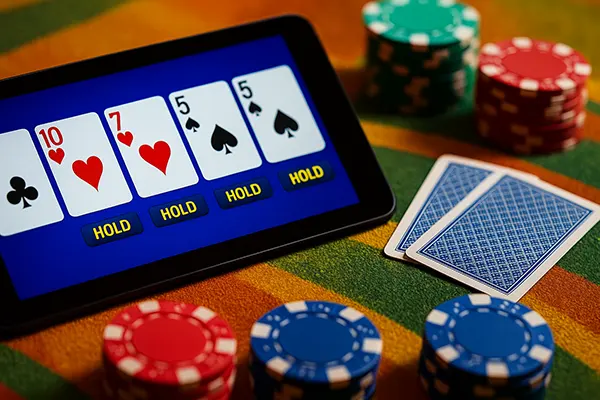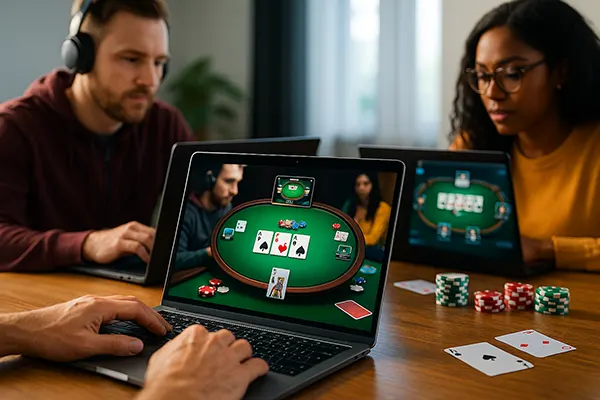
Hybrid Poker Tournaments: Bridging Online and Offline Play
Hybrid poker tournaments are becoming an increasingly significant trend in the global gambling industry. Combining the accessibility of online platforms with the prestige and social elements of live events, these tournaments offer players a uniquely dynamic experience. As of February 2025, the hybrid model has not only proven its sustainability but also pointed towards the future of competitive poker.
Evolution of Hybrid Poker Tournaments
The concept of hybrid poker events emerged out of necessity during the COVID-19 pandemic, when in-person gatherings were limited. Organisers adapted by hosting qualifying rounds online, while keeping final tables or key stages live. This approach enabled continuity while introducing a new format to players around the world.
Since then, leading tournament organisers like the World Series of Poker (WSOP) and PokerStars have refined hybrid formats. For instance, the WSOP Online Championship feeds into the live finals in Las Vegas, drawing players from dozens of jurisdictions. This has democratised participation, allowing players from remote areas to compete at a global level.
By 2025, hybrid tournaments have become a standard feature on many professional poker circuits. The format balances cost-effectiveness, accessibility, and the irreplaceable energy of live poker, gaining popularity among both organisers and participants.
Benefits for Players and Organisers
Hybrid tournaments significantly reduce travel and accommodation costs for early-stage players. Instead of flying across continents for qualifiers, they can now compete from home. This flexibility has expanded participation, increasing prize pools and raising the competitive level of early rounds.
From an organiser’s perspective, hybrid models also optimise logistics. By limiting the number of players who travel for live events, venues can better manage costs, space, and staffing. Additionally, streaming technology has enabled seamless integration between online and offline stages.
For players, hybrid events offer the best of both worlds: the convenience and lower barrier to entry of online play, and the prestige, visibility, and networking of in-person finals. This multifaceted appeal has been key to their continued growth and refinement.
Technology Powering the Hybrid Format
Technological advancements have been central to the success of hybrid poker tournaments. Reliable client software, enhanced anti-cheating protocols, and advanced live streaming solutions ensure the integrity and appeal of these events. As of 2025, blockchain-based verifications and real-time auditing tools are increasingly adopted to maintain transparency.
Platforms such as GGPoker and Partypoker have invested heavily in infrastructure, allowing smooth transitions from online play to live finals. These systems include hand history integration, synchronised player tracking, and secure identity verification processes that maintain tournament continuity.
Moreover, artificial intelligence is being employed to detect unusual betting patterns during online qualifiers. Combined with biometric check-ins at live events, these measures significantly enhance fairness while promoting trust among participants and audiences alike.
Security and Fair Play Standards
Ensuring fair competition is a top priority in hybrid tournaments. Modern anti-collusion tools analyse betting behaviours across multiple tables and time zones, flagging potential irregularities. AI-assisted security has made it more difficult for bad actors to manipulate outcomes during online phases.
In physical venues, RFID-enabled cards, facial recognition, and secure player areas help enforce integrity. Organisers are held to stricter compliance regulations, particularly when events span jurisdictions with varying legal standards.
Transparent rule enforcement, combined with real-time monitoring, ensures consistent gameplay across both environments. Players are increasingly confident in the legitimacy of hybrid events, bolstering long-term trust and engagement.

The Future of Competitive Poker
The hybrid model is set to redefine how major poker events are structured. Organisers are exploring regional live hubs connected via satellite feeds, allowing decentralised finals that maintain global reach. This decentralisation lowers costs while enabling richer local engagement.
As younger digital-native players enter the competitive scene, demand for hybrid formats is expected to grow. They prefer environments where technology complements rather than replaces the in-person poker experience. This generational shift is influencing how events are marketed, staged, and monetised.
Collaborations between gaming tech companies and tournament brands are also accelerating innovation. We may soon see virtual reality components or augmented reality overlays enhancing live viewing experiences, particularly for online audiences following the final tables.
Monetisation and Audience Expansion
Hybrid tournaments present new opportunities for monetisation. Brands can sponsor both online streams and live stages, targeting segmented audiences more effectively. This dual-channel exposure benefits advertisers and provides additional revenue streams for organisers.
Live-streaming platforms like Twitch and YouTube Poker have become integral to hybrid formats. They allow players to build personal brands and attract followings, while organisers reach global viewers with minimal overheads. Engagement tools like interactive polls and chat-driven commentary further boost viewership.
Overall, the hybrid model expands poker’s cultural and commercial footprint. By appealing to digital and traditional audiences alike, it positions the game to thrive in a more inclusive and tech-integrated future.



